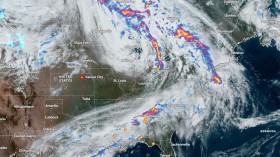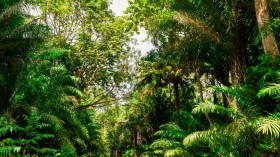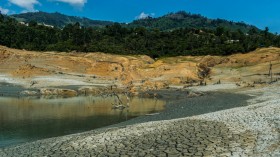Humans are often seen as the ultimate destroyers of the planet, lending the idea of naming a new epoch in our name, but the new PBS series "Earth: A New Wild" is offering a fresh take on the relationship between humans and nature.
The five-part series, which premieres Feb. 4, is hosted by leading conservation scientist Dr. M. Sanjayan who takes viewers on a stunning journey to 29 different countries to show wildlife and its everyday encounters with humans.
"This series is a first for nature films; it turns the camera around and acknowledges that spectacular nature doesn't exist in isolation, that humans are part of the picture," Sanjayan said in a press release. "In this way, we show viewers not only stunning, never before seen natural history but also discover extraordinary stories that challenge the very notion that humans are separate from nature, and how, in the new wild - humans and wildlife can - and must - thrive together."
A trailer can be seen below.
[Credit: PBS]
Using advanced filming techniques, "Earth: A New Wild" depicts stunning shots of creatures all over the world, from huge humpback whales and giant pandas to African lions and Arctic reindeer. These up-close looks at a range of species show that humans and wildlife can co-exist peacefully, despite currently existing problems.
For example, there is the ongoing debate over protecting wolf populations in the United States. Farmers are resisting the presence of wolves by taking matters into their own hands to prevent these predators from preying on their valuable livestock. Also, habitat loss is a major issue for a variety of species, including the Bornean orangutan. These animals are rapidly losing their rainforest habitat as deforestation makes way for palm oil plantations.
And then there's of course man-made climate change - an issue that is still up for debate, even in the Senate - which is wreaking havoc on wildlife species and environments all over the globe.
"Earth has entered a new epoch and we are now living on a planet where our impacts are felt everywhere," Sanjayan said.
But "Earth: A New Wild" may help to show that humans can learn to live in nature, not just with nature, and that even the unlikeliest of species are crucial to our survival.
The new series kicks off Wednesday with back-to-back episodes - "Home," followed by "Plains," starting at 9pm ET on PBS. The following episodes, listed on the press release, will air each subsequent Wednesday through February 25 at 10pm ET. (check local listings).
You can learn more about "Earth: A New Wild" by visiting the website here.
For more great nature science stories and general news, please visit our sister site, Headlines and Global News (HNGN).
© 2024 NatureWorldNews.com All rights reserved. Do not reproduce without permission.





